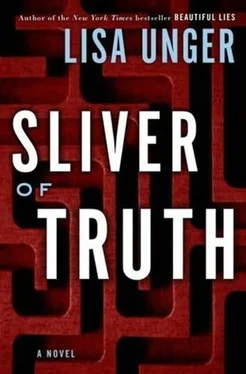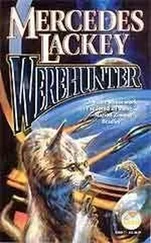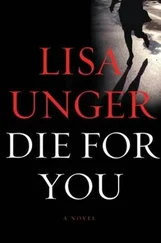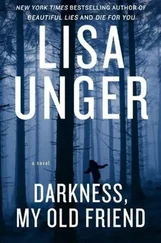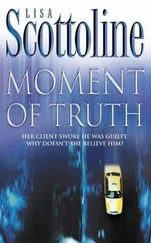Her words were ice water on my face. I felt every nerve ending in my body come alive. I knew all about pulling the veil away from my eyes. I just didn’t want to believe that there might be more to see.
AFTER THE INTERVIEW I took the train back downtown and walked from the Astor Place station to Jake’s studio on Avenue A. I found him in the office, a small windowless room that stood to the side of his workspace (where I knew he hadn’t done any sculpting in six months). The last thing he worked on, a huge Impressionist figure of a man, hulking and mysterious, brooding and strange, stood half-finished and accusatory beneath a bright light.
He heard me come in, got up from his computer, and walked over to me.
“What’s up?” he asked, looking into my face in that way that he had, concerned and knowing.
“I want to know,” I said.
“What?”
“I want to know what you’ve learned about m-Max.” I had almost said my father, but I caught it at the last second. He put his hands on my shoulders and looked hard into my eyes.
“Ridley, are you sure?”
“I’m sure,” I said. I might have even meant it.
The Detroit Metro Airport was absolutely grisly. The walk from my gate past dirty walls and over worn, hideous carpet was endless; I swear it was at least a mile before I made it outside. Standing out in the bitter cold, I waited for what seemed like an eternity for the rental car shuttle as the wind whipped at my thin leather jacket, snaked up my sleeves, and chilled me to the bone. I felt nervous on top of it. I was shaken by the things Jake had told me yesterday and had a strange feeling of being watched. I hoped I was just being paranoid.
The area surrounding the airport was equally grim. I stared out the filthy shuttle-bus window at miles of flat gray landscape, black dead trees, and ground already dusted with snow though it was only early November. Because of the thick cloud cover, it was hard to imagine the sun ever shining down on this place.
I’d been here before as a child, though I barely remembered those infrequent visits to my grandparents when they were still alive. My father hated the place where he’d grown up with Max. They both hated it, remembered it as a rough industrial town grinded by poverty, crime, and bitter cold. He and Max spoke of their leaving as if it had been a prison break.
“Places like that breed a low expectation of what your life can be. That grayness leaks concrete into your skin. So many people never leave, never even think of leaving. Once you do, you can hardly stand to go back even to visit.”
My father had told me that more than once, and driving out of the rental car lot, I could see it. The landscape alone was exhausting in its ugliness. As I pulled onto the highway, I thought about Max and Ben, how they never talked much about their childhoods.
“Not much to tell,” my father would say. “I worked hard at school. I obeyed my parents. Then I left for Rutgers and never went back for more than a weekend at a time.”
But really, there was a lot to tell. My father and Max grew up together, met each other while riding Big Wheels up and down the block. Ben was shy, the good boy, loved and cherished by strict parents, an only child. Max was the wild one, always unkempt, always in trouble. My father told me he’d look out his window late at night sometimes, after eleven, and see Max riding his bike up and down the road beneath the yellow glow of the street lamps. At the time he was envious of Max’s freedom, felt like a baby in his Howdy Doody pajamas, his homework done and packed in his bag for the next day, his clothes cleaned and pressed and laid out for him.
“I worshiped him,” my father had said of Max. Max echoed the sentiment more times than I can remember.
If you’ve been with me from the beginning, you know what happened to Max. His father, an abuser and an alcoholic, beat Max’s mother into a coma where she languished for weeks and finally died. Max’s father was found guilty of murder, largely due to Max’s testimony, was sentenced to life in prison, and died there years later. Rather than let Max become a ward of the state, my grandparents took him in. Max, who’d always been in trouble, who’d always done poorly in school, calmed down and excelled in my grandparents’ care. They raised him as their own and somehow managed to help both boys through college on my grandfather’s autoworker’s salary.
This is a story I’ve known all my life. I’ve known that my wonderful and loving grandparents took Max in and saved him from God knows what fate. That Max was the wild boy, the rebel child. That my father was the good boy, the honor student. But that wasn’t the truth. My truth was that my father was the abused child, that my grandfather murdered my grandmother and then later died in prison. That was my legacy, that’s what I came from. When I think about it, I feel as if someone hit me in the head with a two-by-four.
I have always been the good girl with my pajamas on and my homework done…just like Ben. Except lately I’ve begun to wonder, what if I’m not like Ben at all? What if at the core of who I am, in the strands of my DNA, I’m more like Max? Even before I knew we were kin, I knew we were kindred spirits. What if nature wins out over nurture? Who am I then?
I THOUGHT ABOUT the conversation with Jake that had precipitated this unscheduled trip to Detroit. He’d had a lot to say about Max. None of it made much sense and I was seriously starting to doubt Jake’s stability. The conversation ended with us screaming at each other like trailer trash and my storming out. I did a lot of storming out where Jake was concerned. Always had, even from the beginning. He had this way of being his most calm when I was at my most furious. And it never failed to throw me over the edge. Okay, so it was me who ended up screaming like an idiot last night in Jake’s studio, while he sat in a state of patient empathy. He’s lucky I didn’t punch him, I hated him so much in that moment. But he was used to this. Jake’s karma was to be the truth sayer, to seek out and bring to light the things that everyone else wanted to bury. It seemed to me that that was his cosmic role, in my life especially.
“I’m just not sure you’re going to want to hear what I have to say,” he’d predicted.
“I do,” I’d said. “I really do.”
Elena Jansen’s denial had cost her the most precious things in her life-her children. There’s always a cost for denial. How high a cost depends largely on the importance of the truth being ignored. You deny that you’re unhappy in your chosen profession and the cost might be, say, migraine headaches. You deny signs that your abusive husband has a psychotic need to control you and he kills your children. Not that I’m blaming Elena, of course. Of course not. What I’m saying is that our actions, our choices have consequences that are sometimes impossible to predict. But when our actions and choices are based on fear and denial…well, nothing good can come of that. Ever. I had learned this the hard way. Was still learning. That was why I had decided that if there was something to know about Max, I wanted to know it. Not that I believed that he’d come back from the dead.
“Okay, Ridley,” Jake said with a sigh. “As you know, after the feds cleared your father and found Esme Gray to have too small and ambiguous a role to prosecute for Project Rescue on anything but possible conspiracy charges, they decided to close the case,” Jake began. “All the major players-Max, Alexander Harriman namely-were dead. Everyone else who might have been involved in the shadow side of the organization was a ghost. There were no records. Project Rescue was a labyrinth of dark connections, impossible to navigate.”
Читать дальше
